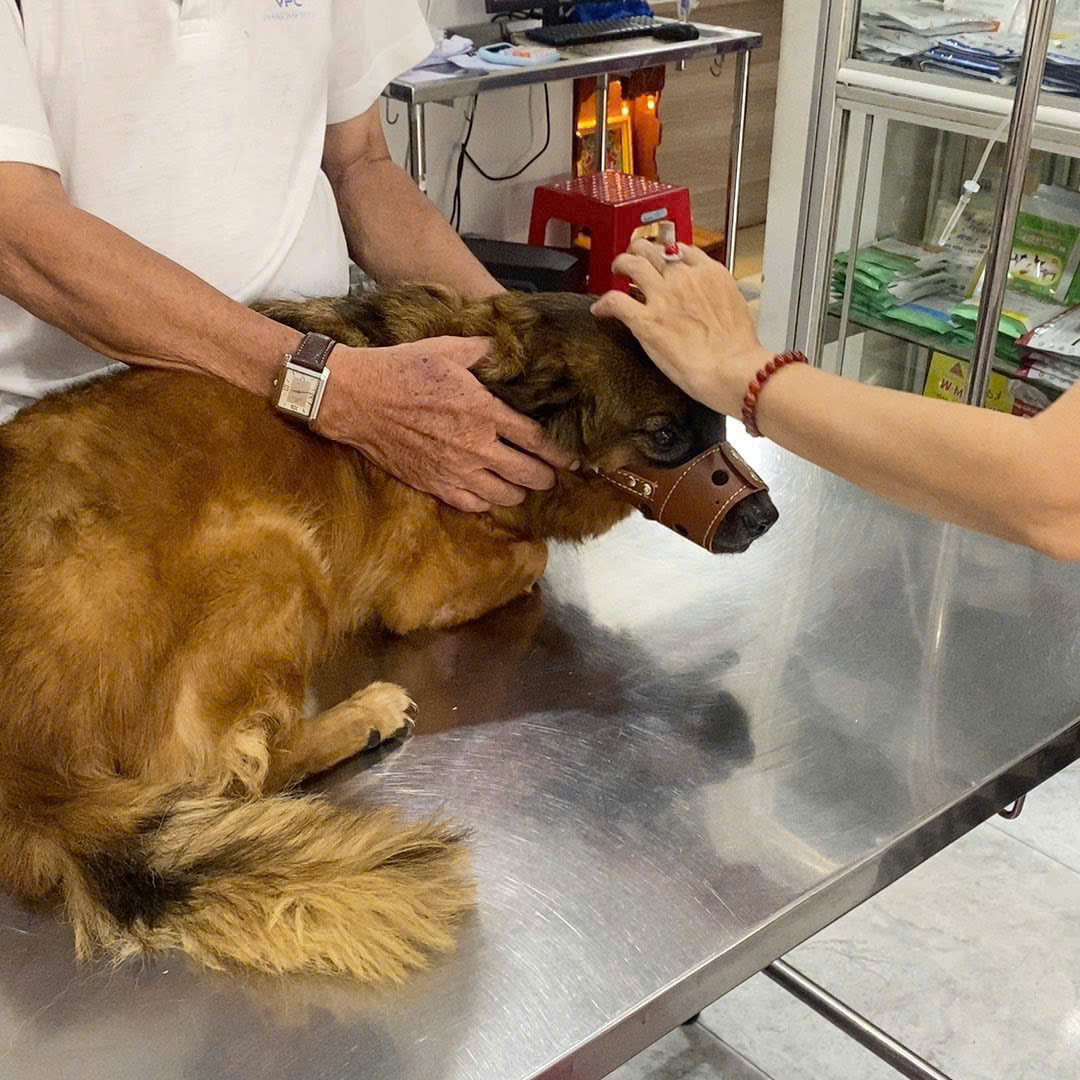Quynh adopted Phen two years ago to guard the store. Usually chained in a corner, Phen was occasionally allowed to roam around the house. According to Quynh, Phen was a gentle dog and had never attacked anyone, even when stepped on by children, so she wasn't muzzled.
Two months ago, Phen suddenly barked fiercely and bit a customer's leg, drawing blood. Quynh had to compensate the customer for medical expenses, visit them, and take them for rabies vaccinations. She was only able to breathe a sigh of relief after the customer completed the vaccination schedule and their health stabilized.
Quynh said that since the incident, some regular customers have been hesitant to visit or shop at her store, worried about Phen, despite the dog now being caged and muzzled.
 |
Thu Uyen's dog, Lu, was vaccinated against rabies and muzzled after biting someone. Photo: NVCC |
Thu Uyen's dog, Lu, was vaccinated against rabies and muzzled after biting someone. Photo: NVCC
Similar to Thao Quynh, Thu Uyen, 30, an office worker in Tan Hung ward, TP HCM, also experienced distress after her pet dog bit her close friend. Uyen said Lu had lived with her family for 7 years, kept indoors, and only muzzled and leashed when taken outside.
Two weeks ago, Uyen's friend visited and parked their motorbike close to the gate. Lu unexpectedly jumped up and bit her friend's hand. Uyen took her friend for a medical check-up and rabies vaccination. "Rabies has a 100% mortality rate. I was terrified of the potential consequences and would have regretted it for the rest of my life," she said. Since then, Lu has always been muzzled when strangers enter the yard.
Quynh and Uyen's experiences are not uncommon. Doctor Bui Thanh Phong, Medical Manager of VNVC Vaccination System, explained that several factors can cause dogs and cats to lose control and behave differently from their usual demeanor.
Many animals have a strong territorial instinct and react defensively when strangers enter their home. Animals experiencing pain or discomfort are also more sensitive and prone to attack when touched. Lack of exercise, prolonged confinement, and limited social interaction can also contribute to unusual behavior in animals.
Doctor Phong noted that during hot weather, pets are more irritable. Dogs and cats dehydrate and suffer from heatstroke easily, leading to fatigue and heightened defensive reactions to external stimuli. In this state of discomfort, they tend to bark, growl, or attack when they see strangers, especially when chained or confined in small spaces. If owners don't carefully observe and control their pets' behavior, biting incidents are likely to increase.
Data from the Department of Animal Health shows that Vietnam has over 4.9 million households raising dogs and cats, totaling 7.6 million animals. The national rabies prevention and control program aims to vaccinate 70% of the total animal population between 2022 and 2025, and 80% between 2026 and 2030. However, the percentage of fully vaccinated pets remains low, posing a high risk of rabies outbreaks.
 |
VNVC Vaccination System has recorded a high number of rabies vaccinations during the hot season. Photo: Binh An |
VNVC Vaccination System has recorded a high number of rabies vaccinations during the hot season. Photo: Binh An
Doctor Phong cautioned that even if pets are vaccinated against rabies, the risk of transmission to humans through bites is not entirely eliminated. If pets haven't received the full dosage, haven't had their booster shots on time, or their bodies haven't developed sufficient immunity, they can still transmit the disease. Moreover, dogs and cats can contract rabies through contact with each other, such as licking and biting, or by interacting with rodents like rats, without their owners' knowledge.
Pets can transmit the rabies virus to humans through bites, scratches, licks on open wounds, etc. The incubation period is typically 2 to 8 weeks, but it can be shorter or last over a year, depending on the severity and location of the wound and the viral load. Once rabies develops, the mortality rate is almost 100% for both pets and humans. Therefore, Doctor Phong advises muzzling dogs in public, preventing them from interacting with visitors, and not leaving children alone with them.
The most effective preventive measure currently recommended is vaccination. Vietnam currently has two types of rabies vaccines: Verorab (France) and Abhayrab (India). Individuals bitten or scratched by an animal (who have never been vaccinated) require five doses on days 0, 3, 7, 14, and 28, administered intramuscularly; or eight doses on days 0, 3, 7, and 28, administered intradermally.
For proactive vaccination before any animal contact, the schedule consists of three basic doses (on days 0, 7, and 21 or 0, 7, and 28) and booster shots for high-risk individuals. If someone has received the full course of vaccinations, they will receive two additional doses on days 0 and 3, either intramuscularly or intradermally, for subsequent bites or scratches.
In case of a dog or cat bite, wash the wound, avoid bruising it, and don't cover it tightly. Seek immediate medical attention for examination, consultation, vaccination, and rabies antiserum. Never attempt self-treatment or consult traditional healers.
Video explaining the mechanism of rabies virus attack. Video: Seeker
Binh Nguyen












